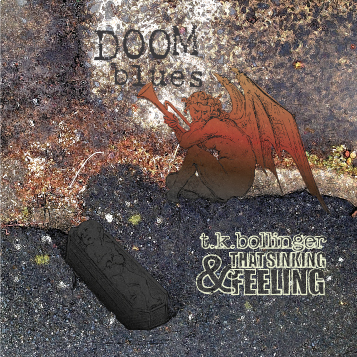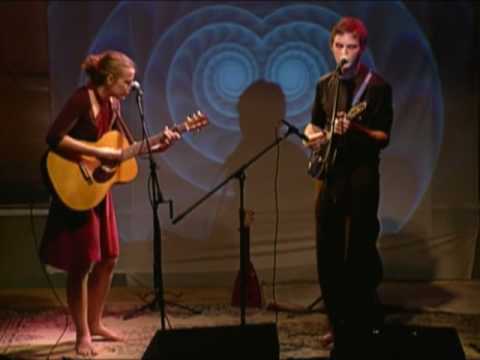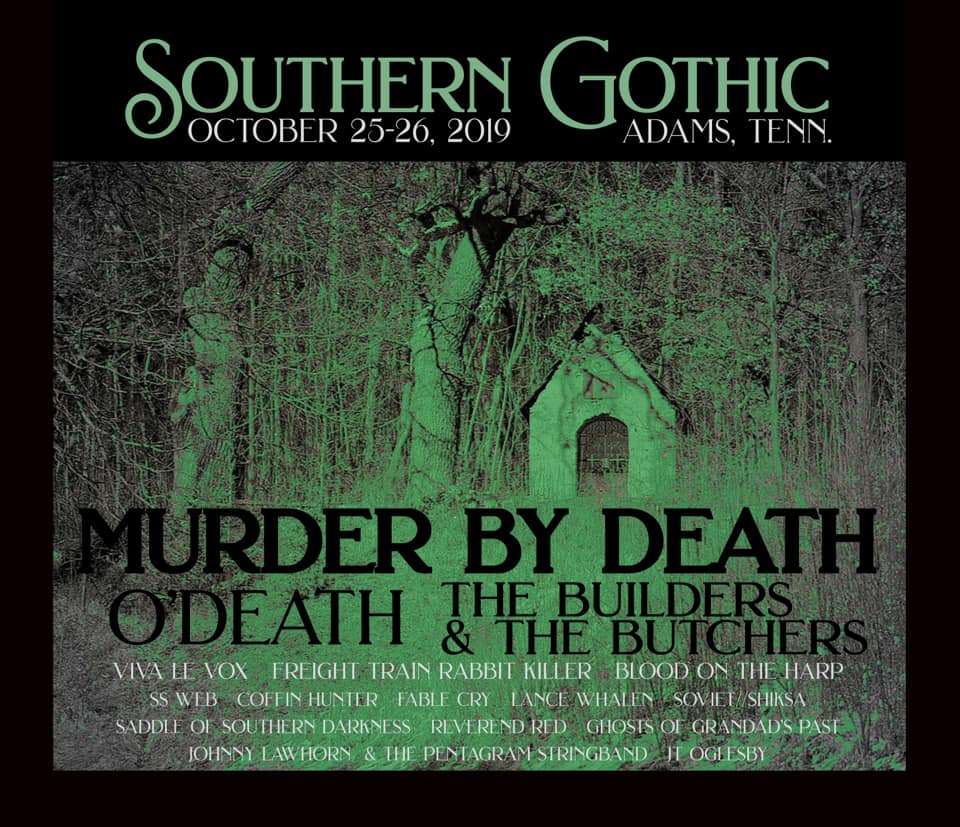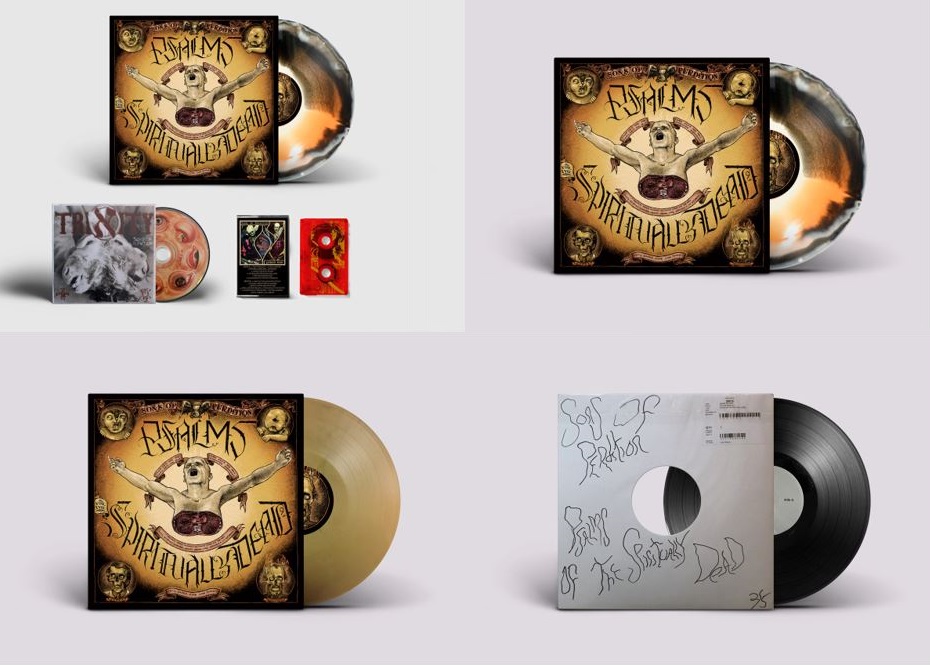 If there for some inexplicable reason had been a service like TripAdvisor for the gothic country genre then Those Poor Bastards would have received customer reviews like "key provider", "reliable", "always high and consistent quality" and "on time". Now is time for delivery again. Their tenth album "Evil Seeds" was released on November 15, 2019. For this album they barricaded themselves in the basement of a 1930's schoolhouse to see what horrors they could conjure when completely cut off from the corrupting influence of the modern world. The album title probably refer to Matthew 13:38 (King James version) "The field is the world; the good seed are the children of the kingdom; but the tares are the children of the wicked one", i.e. the Devil. TPB assess that this is their perhaps most cohesive album. It may be cohesive, but not beyond reproach. The album is a departure from their raw, unpolished and distorted style. Clearly, the edges are abraded. In my opinion, the TPB greatness lies in that their music is rough around the edges. The new songs are not bad, but the songwriting doesn't live up to their usual standards. The declaration "These songs feature classic themes of violent struggle and loss with bizarre overtones of supernatural menace and dread." doesn't match my expectations. I hope this was a one-off event and not the beginning of a downward trend. One song stand out, the slow and dreamy "Neglected Wife". To sum it up. "Evil Seeds" doesn't live up to the seductive album cover. Only "Neglected Wife" will take place on my prestigious TPB compilation list.
If there for some inexplicable reason had been a service like TripAdvisor for the gothic country genre then Those Poor Bastards would have received customer reviews like "key provider", "reliable", "always high and consistent quality" and "on time". Now is time for delivery again. Their tenth album "Evil Seeds" was released on November 15, 2019. For this album they barricaded themselves in the basement of a 1930's schoolhouse to see what horrors they could conjure when completely cut off from the corrupting influence of the modern world. The album title probably refer to Matthew 13:38 (King James version) "The field is the world; the good seed are the children of the kingdom; but the tares are the children of the wicked one", i.e. the Devil. TPB assess that this is their perhaps most cohesive album. It may be cohesive, but not beyond reproach. The album is a departure from their raw, unpolished and distorted style. Clearly, the edges are abraded. In my opinion, the TPB greatness lies in that their music is rough around the edges. The new songs are not bad, but the songwriting doesn't live up to their usual standards. The declaration "These songs feature classic themes of violent struggle and loss with bizarre overtones of supernatural menace and dread." doesn't match my expectations. I hope this was a one-off event and not the beginning of a downward trend. One song stand out, the slow and dreamy "Neglected Wife". To sum it up. "Evil Seeds" doesn't live up to the seductive album cover. Only "Neglected Wife" will take place on my prestigious TPB compilation list.
 Unaffected, uncompromising and underrated. I associate these three adjectives, but not necessarily in that order, with T.K. Bollinger. A year or so ago the Australian artist went, without prior notice, off the grid. Reportedly, he felt a strong need to tune out from social media and concentrate on songwriting and think about what was next. I wish that more artists had the guts to follow his example. Instead, they do the complete opposite. Anyway, T.K. Bollinger has returned with a "new" album called "Doom Blues". This is a whole band album - t.k. Bollinger & That Sinking Feeling with Vis Ortis (drums) and Richard Amor (bassist). The word "new" is knowingly placed between quotation marks since the eleven songs are the result of the rehearsals and recording sessions in Northcote (a suburb of Melbourne) during 2013/14. The songs have been nursed over the years and finally been mixed and released. This odd circumstance got my attention since these recordings preceded T.K. Bollinger's three solo albums "Shy Ghosts" (2016), "What's Left Now You Are Dead To Me" (2017) and "The Tighter You Hold Onto Something The More Likely It Will Fall Apart In Your Hands" (2018). Could there be a link to them or a piece of the jigsaw here? I've had the opportunity to pre-listen to the album. I pushed the play button with trembling hands. The opening song "My Shadow's Loving Arms" brutally transcends me to Wasa Skivbörs, an old record store in Stockholm better known for exclusively and constantly playing albums with 12 Bar Blues Progression. I froze on the spot. Could this be a dedicated blues album? No, thankfully it isn't. My limbs thawed. It is what it says: doom blues. It incorporates moods from mangling gothic to sensitive hymnal. The second and third song "Fear Comes Knocking" and "A Land of Thieves and Liars" are good examples of the shifting moods. The fourth song "The Bridges You Burnt" clearly belongs to one of the highlights on the album. "Fortune loves you best / When your heart knows no rest / It brought you here to build / But you chose to break its will / And made those bridges burn". The fifth song "Hold Her When Her Heart Is Breaking" clearly has a softer approach and could easily fit in on of any of the later solo albums. The sixth song "What My Devils Know" is twangy, but a bit weak. The seventh and eight songs "Leaving Me Empty" and "To Lose the Darkness" are simply magnificent. The same can be said about the ninth song "The White Man's Game". So far, I'm impressed of the song quality and it's not over yet. The next to last song has the witty title "Sex Starved and Money Hungry". In this tenth song T.K. Bollinger stretches his vocal abilities to the limit. The closing song is very important. It concludes the album and, when it's done meticulously, wraps it all up. What's better than to end an album in a splendid crescendo? The eleventh song has the title "Twelve Reasons Not to Live Forever". "There is no pause, no escape button, one exit clause / No control Z, just this endless loop running in your head / Why? Why, why, why / Will no answer come? And all you can do is / laugh or cry". And then it's all over. I ask myself: is there a link and a common thread from this album to the solo albums? I think the answer is yes. If this was copyright law than this album would pass the threshold of originality with very large safety margins. "Doom Blues" is more versatile than "A Catalogue of Woe" and an indispensable part of the musical progress of T.K. Bollinger. The press release is modest: "Others may have given up, but t.k. bollinger and that sinking feeling continued to have faith in these songs and the process that they committed themselves to, uncaring for recognition or reward, they merely wanted to bring these stories to the light. Now it’s your turn to listen and see if you can hear their worth." The answer is yes, yes and yes! If this is the final testament of t.k. Bollinger & That Sinking Feeling then they surely went out in style. You can order the album here (opens in a new window).
Unaffected, uncompromising and underrated. I associate these three adjectives, but not necessarily in that order, with T.K. Bollinger. A year or so ago the Australian artist went, without prior notice, off the grid. Reportedly, he felt a strong need to tune out from social media and concentrate on songwriting and think about what was next. I wish that more artists had the guts to follow his example. Instead, they do the complete opposite. Anyway, T.K. Bollinger has returned with a "new" album called "Doom Blues". This is a whole band album - t.k. Bollinger & That Sinking Feeling with Vis Ortis (drums) and Richard Amor (bassist). The word "new" is knowingly placed between quotation marks since the eleven songs are the result of the rehearsals and recording sessions in Northcote (a suburb of Melbourne) during 2013/14. The songs have been nursed over the years and finally been mixed and released. This odd circumstance got my attention since these recordings preceded T.K. Bollinger's three solo albums "Shy Ghosts" (2016), "What's Left Now You Are Dead To Me" (2017) and "The Tighter You Hold Onto Something The More Likely It Will Fall Apart In Your Hands" (2018). Could there be a link to them or a piece of the jigsaw here? I've had the opportunity to pre-listen to the album. I pushed the play button with trembling hands. The opening song "My Shadow's Loving Arms" brutally transcends me to Wasa Skivbörs, an old record store in Stockholm better known for exclusively and constantly playing albums with 12 Bar Blues Progression. I froze on the spot. Could this be a dedicated blues album? No, thankfully it isn't. My limbs thawed. It is what it says: doom blues. It incorporates moods from mangling gothic to sensitive hymnal. The second and third song "Fear Comes Knocking" and "A Land of Thieves and Liars" are good examples of the shifting moods. The fourth song "The Bridges You Burnt" clearly belongs to one of the highlights on the album. "Fortune loves you best / When your heart knows no rest / It brought you here to build / But you chose to break its will / And made those bridges burn". The fifth song "Hold Her When Her Heart Is Breaking" clearly has a softer approach and could easily fit in on of any of the later solo albums. The sixth song "What My Devils Know" is twangy, but a bit weak. The seventh and eight songs "Leaving Me Empty" and "To Lose the Darkness" are simply magnificent. The same can be said about the ninth song "The White Man's Game". So far, I'm impressed of the song quality and it's not over yet. The next to last song has the witty title "Sex Starved and Money Hungry". In this tenth song T.K. Bollinger stretches his vocal abilities to the limit. The closing song is very important. It concludes the album and, when it's done meticulously, wraps it all up. What's better than to end an album in a splendid crescendo? The eleventh song has the title "Twelve Reasons Not to Live Forever". "There is no pause, no escape button, one exit clause / No control Z, just this endless loop running in your head / Why? Why, why, why / Will no answer come? And all you can do is / laugh or cry". And then it's all over. I ask myself: is there a link and a common thread from this album to the solo albums? I think the answer is yes. If this was copyright law than this album would pass the threshold of originality with very large safety margins. "Doom Blues" is more versatile than "A Catalogue of Woe" and an indispensable part of the musical progress of T.K. Bollinger. The press release is modest: "Others may have given up, but t.k. bollinger and that sinking feeling continued to have faith in these songs and the process that they committed themselves to, uncaring for recognition or reward, they merely wanted to bring these stories to the light. Now it’s your turn to listen and see if you can hear their worth." The answer is yes, yes and yes! If this is the final testament of t.k. Bollinger & That Sinking Feeling then they surely went out in style. You can order the album here (opens in a new window).
 The traditional song "The House Carpenter" has been covered many times. Too many times, if you ask me. One version is worse than the other. The interpretations span from old gutsy sea shanties to torturous singer-songwriter takes. In some cases it's not so obvious. The late Dutch-Swedish troubadour Cornelis Vreeswijk just ripped the chords in his song "Somliga Går I Trasiga Skor" without giving any credit. However, one version stand out: a duet with Gabrielle Louise and David Rynhart from a show in 2009 (if you double-click on the image, a video clip will open in a new window). For what I can tell she plays a Martin guitar (Sustainable Wood Series model) and he plays an Epiphone mandolin (MM30 model). I feel uncomfortable to point this out, but David Rynhart is a wooden-stiff pretty-boy who should have stuck to the mandolin playing and backing vocals. Bear in mind, his vocal parts are supposed to represent a dead ghost or the Devil trying to entice the female protagonist. So what makes this version great? It's Gabrielle Louise, at the time a twenty-four year old woman with tied up hair, barefoot, in cardinal dress. She pulls all the weight. And I mean, all the weight. Her empathy, sensitivity, stage presence, energy level and facial expression are truly amazing. Take a good look. This is how a musician looks like. Her crystal-clear vocal parts represent the female protagonist and cuts through bone and marrow. Read more about the song here (opens in a new window). The last two verses in the song are dark as the night and heavy as lead (even by gothic country standards).
The traditional song "The House Carpenter" has been covered many times. Too many times, if you ask me. One version is worse than the other. The interpretations span from old gutsy sea shanties to torturous singer-songwriter takes. In some cases it's not so obvious. The late Dutch-Swedish troubadour Cornelis Vreeswijk just ripped the chords in his song "Somliga Går I Trasiga Skor" without giving any credit. However, one version stand out: a duet with Gabrielle Louise and David Rynhart from a show in 2009 (if you double-click on the image, a video clip will open in a new window). For what I can tell she plays a Martin guitar (Sustainable Wood Series model) and he plays an Epiphone mandolin (MM30 model). I feel uncomfortable to point this out, but David Rynhart is a wooden-stiff pretty-boy who should have stuck to the mandolin playing and backing vocals. Bear in mind, his vocal parts are supposed to represent a dead ghost or the Devil trying to entice the female protagonist. So what makes this version great? It's Gabrielle Louise, at the time a twenty-four year old woman with tied up hair, barefoot, in cardinal dress. She pulls all the weight. And I mean, all the weight. Her empathy, sensitivity, stage presence, energy level and facial expression are truly amazing. Take a good look. This is how a musician looks like. Her crystal-clear vocal parts represent the female protagonist and cuts through bone and marrow. Read more about the song here (opens in a new window). The last two verses in the song are dark as the night and heavy as lead (even by gothic country standards).
"What hills, what hills are those, my love,
That rise so fair and high?
Those are the hills of heaven, my love,
But not for you and I." [this version: "That you and I must deny"]
"And what hills, what hills are those, my love,
Those hills so dark and low?
"Those are the hills of hell, my love,
Where you and I must go."
The normal thing for me to do would be to thoroughly check out her music and albums. But, I'm afraid of what I might find. I honestly don't care if she later became a mainstream artist. However, I do want this moment to last forever.
 This weekend Southern Gothic Campout took place for the second time. The headliners were no less than Murder By Death, O'Death and The Builders & The Butchers. However, there is a world of difference between them and the bands in smaller fonts. Not only in terms of being renowned, but in terms of being gothic. More bluntly put, do all fit the gothic bill? The genre shares thematic connections with the Southern Gothic genre of literature. Songs often examine poverty, criminal behavior, religious imagery, dysfuntional relationships, death, ghosts, twisted love, alcohol and drugs in all forms, murder, the Devil and betrayal. The festival arranger, Muddy Roots Records, stretches the Southern Gothic concept to its limits in their promotion of the event (choice of imagery, fraktur-style fonts and references to the Bell witch). One example: "We’re headed back into the dark woods of Adams, TN., home of the chilling Bell Witch lore. We hope to survive camping Friday and Saturday along the blood Red River." Maybe people want to be tickled. The selection critera of bands doesn't meet my purist demands. Does it matter? A dedicated music festival is better than no festival. But words do matter. Southern Gothic should be reserved for Southern Gothic. Personally, I would "rather be dead in a ditch" than to use the term "Southern Gothic" incorrectly. A spade is a spade, and not a gardening tool.
This weekend Southern Gothic Campout took place for the second time. The headliners were no less than Murder By Death, O'Death and The Builders & The Butchers. However, there is a world of difference between them and the bands in smaller fonts. Not only in terms of being renowned, but in terms of being gothic. More bluntly put, do all fit the gothic bill? The genre shares thematic connections with the Southern Gothic genre of literature. Songs often examine poverty, criminal behavior, religious imagery, dysfuntional relationships, death, ghosts, twisted love, alcohol and drugs in all forms, murder, the Devil and betrayal. The festival arranger, Muddy Roots Records, stretches the Southern Gothic concept to its limits in their promotion of the event (choice of imagery, fraktur-style fonts and references to the Bell witch). One example: "We’re headed back into the dark woods of Adams, TN., home of the chilling Bell Witch lore. We hope to survive camping Friday and Saturday along the blood Red River." Maybe people want to be tickled. The selection critera of bands doesn't meet my purist demands. Does it matter? A dedicated music festival is better than no festival. But words do matter. Southern Gothic should be reserved for Southern Gothic. Personally, I would "rather be dead in a ditch" than to use the term "Southern Gothic" incorrectly. A spade is a spade, and not a gardening tool.
 Sons of Perdition's immoderate album "Psalms for the Spiritually Dead" (PFTSD) has never been released physically. Until now. It was originally released in 2010 as a download only album. In 2014 a remastered version followed. According to Zebulon Whatley, it's louder and a bit brighter than the original version. Nine years after the original release the small label Secret Records in Madison, Wisconsin will release the gloomy album on vinyl. The label specializes in very limited editions of vinyl and cassettes. It's run by Vincent Presley (touring member of Those Poor Bastards). Preorder the vinyl here (opens in a new window). Secret Records offers a wide range of different alternatives: a limited edition Bone/Black/Orange swirl for $30 (100 copies), a limited edition GOLD vinyl for $25 (150 copies) or Test pressing on black vinyl, white labels and hand-written jackets for $75 (5 copies). You can also preorder the Vinyl/CD/Tape BUNDLE DEAL for only $40. It contains PFTSD on either color of vinyl, a CD of Trinity, and; the Gathered Blood / Spilt Blood Cassette at a discount. That's what I call a good deal. All offers includes unlimited streaming via the free Bandcamp app. Zebulon Whatley's idea for the sound on PFTSD was "overwhelmingly bleak". Mission accomplished and greatly exceeded. It takes a certain kind of disposition to listen to the album in one swipe. The vinyl format has the advantage that you can divide the overwhelmingly bleakness into two fairly equal parts.
Sons of Perdition's immoderate album "Psalms for the Spiritually Dead" (PFTSD) has never been released physically. Until now. It was originally released in 2010 as a download only album. In 2014 a remastered version followed. According to Zebulon Whatley, it's louder and a bit brighter than the original version. Nine years after the original release the small label Secret Records in Madison, Wisconsin will release the gloomy album on vinyl. The label specializes in very limited editions of vinyl and cassettes. It's run by Vincent Presley (touring member of Those Poor Bastards). Preorder the vinyl here (opens in a new window). Secret Records offers a wide range of different alternatives: a limited edition Bone/Black/Orange swirl for $30 (100 copies), a limited edition GOLD vinyl for $25 (150 copies) or Test pressing on black vinyl, white labels and hand-written jackets for $75 (5 copies). You can also preorder the Vinyl/CD/Tape BUNDLE DEAL for only $40. It contains PFTSD on either color of vinyl, a CD of Trinity, and; the Gathered Blood / Spilt Blood Cassette at a discount. That's what I call a good deal. All offers includes unlimited streaming via the free Bandcamp app. Zebulon Whatley's idea for the sound on PFTSD was "overwhelmingly bleak". Mission accomplished and greatly exceeded. It takes a certain kind of disposition to listen to the album in one swipe. The vinyl format has the advantage that you can divide the overwhelmingly bleakness into two fairly equal parts.
